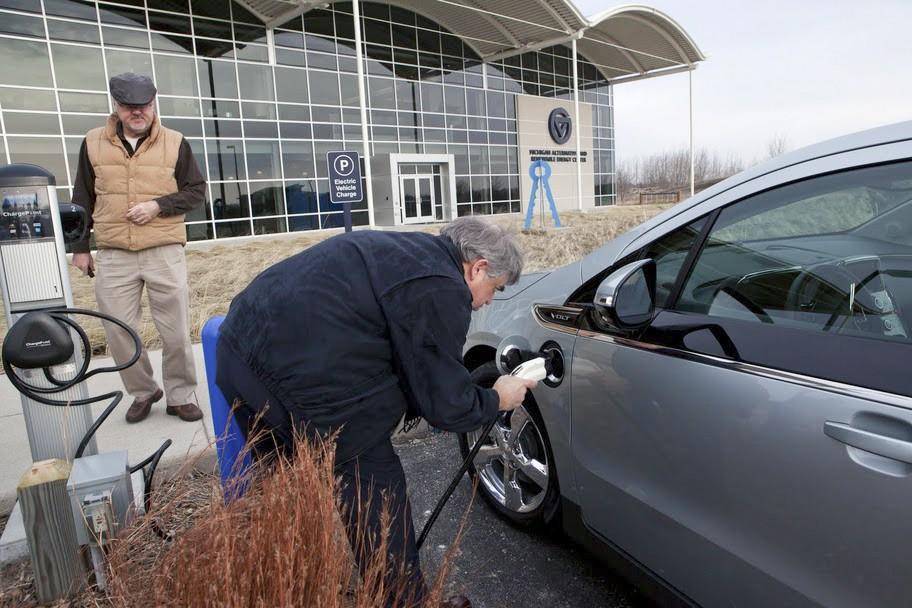GV installs 7 electric vehicle charging stations on campuses

Courtesy Photo / MAREC MAREC Director Arn Boezaart uses an electric vehicle charging station in Muskegon to charge up a Chevy Volt. GVSU recently installed seven new electric vehicle charging stations in Allendale, Grand Rapids and Muskegon.
Nov 21, 2011
The announcement of the new stations was coupled with a demonstration at the Pew Campus’ Padnos College of Engineering and Computing on Wednesday, using GVSU’s new Cheverlet Volt electric service vehicle.
The university was awarded the new service stations as part of a federal grant from the Department of Energy applied for by the university, said Tim Thimmesch, assistant vice president of Facilities Services.
Bart Bartels, sustainability manager at GVSU, said the grant application was led at no cost. Installation costs totaled $2,200 per station and were covered by this year’s parking budget.
“We are in the position of the chicken or the egg,” said Paul Plotkowski, dean of the Padnos College of Engineering and Computing. “While you can charge these stations at home from any standard outlet, people can’t start buying a large number of vehicles if there are no stations to charge them.”
He said charging an electric vehicle at home from standard outlets is convenient, and GVSU is trying to be proactive in the deployment of these types of stations throughout its campuses.
“Think of using a regular car if the only place you could get gas is at home,” Plotkowski said. “The stations can’t get a lot of use until more plug-in cars are on the road.”
With the addition of the new seven stations, there will be 13 electric vehicle stations total throughout GVSU’s Allendale, Pew and Muskegon campuses, said David Feenstra, maintenance supervisor for Facilities Services. The Pew Campus added stations in the Keller Lot, Seward lot and two in the ground level of the parking ramp.
“The sites were selected to serve students, faculty and staff,” Feenstra said.
He said installation was made easier by selecting sites located near building power sources, and that planning for the addition at the Keller Lot made the installation pretty simple.
Plotkowski said the sites were also selected to make the stations accessible for a wide range of campus, and to minimize cost.
“Electric vehicles are an innovative way to address issues facing the future of transportation, because the status quo is not a sustainable option,” Bartels said. “For Grand Valley, providing charging stations allows our community to utilize these types of vehicles, and enables them to reduce their carbon footprint.”
Electric car programs also help to retain a larger share of energy expenditure within the state and provide an economic benefit to the community, said Bartels.
Nationwide maps of charging stations for electric cars can be found online at www.mychargepoint.net.

























